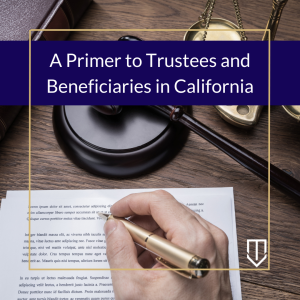 A trust is a legal device that is commonly used in estate planning. A trust represents “a collection of assets and liabilities” that can be held and transferred by an individual to another individual, the “beneficiary.” (Portico Mgmt. Grp., LLC v. Harrison (2011) 202 Cal.App.4th 464, 473.) When the trustee, the person responsible for managing and distributing the trust’s assets, has a personal interest in those assets, certain problems can arise. This is because the trustee is bound by several legal duties designed to safeguard the interests of the beneficiaries. Therefore, if a trustee is also a beneficiary, they must make sure that they do not unduly favor themselves at the expense of the other beneficiaries.
A trust is a legal device that is commonly used in estate planning. A trust represents “a collection of assets and liabilities” that can be held and transferred by an individual to another individual, the “beneficiary.” (Portico Mgmt. Grp., LLC v. Harrison (2011) 202 Cal.App.4th 464, 473.) When the trustee, the person responsible for managing and distributing the trust’s assets, has a personal interest in those assets, certain problems can arise. This is because the trustee is bound by several legal duties designed to safeguard the interests of the beneficiaries. Therefore, if a trustee is also a beneficiary, they must make sure that they do not unduly favor themselves at the expense of the other beneficiaries.
What is a trustee?
A person who creates a trust, the “settlor,” names a “trustee” who holds legal title to the property held in the trust for the benefit of one or more persons, the “beneficiaries.” (Greenspan v. LADT, LLC (2010) 191 Cal.App.4th 486, 521.) The settlor can create a voluntary or express trust through a formal agreement where the settlor details his intentions regarding the trustee and beneficiaries. A property owner can designate himself as a trustee, creating an express trust holding his property. (Probate Code § 15200(a).) The owner can also designate a third party as a trustee. A trust can be created during the settlor’s life, or, it can be created by a will where it becomes effective upon the settlor’s death.
 California Partition Law Blog
California Partition Law Blog


 A declaration of non-monetary status is a special type of court filing reserved for trustees under
A declaration of non-monetary status is a special type of court filing reserved for trustees under